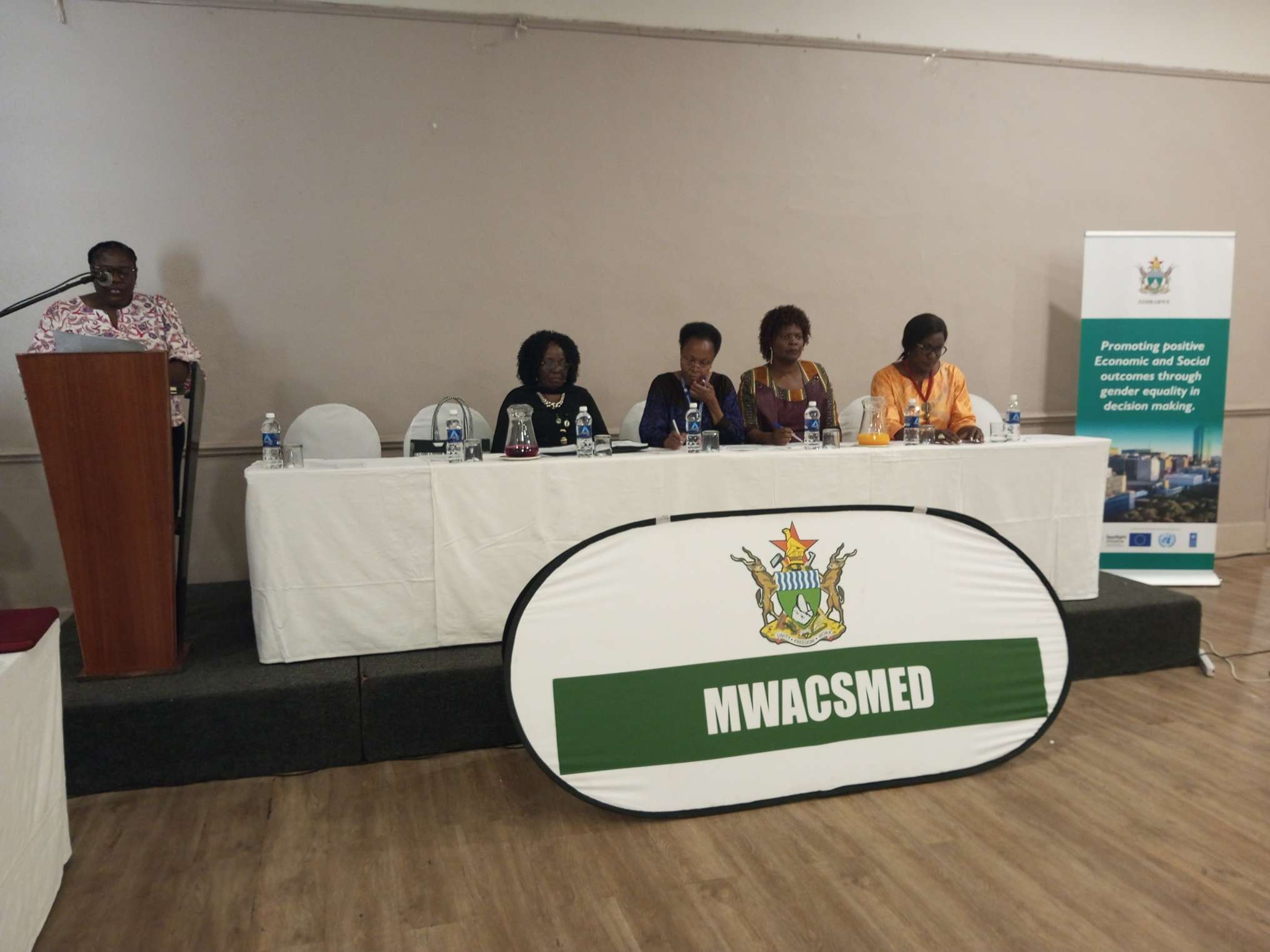|
Getting your Trinity Audio player ready...
|
Zimbabwe has launched the Women in Leadership and Decision-Making Strategy in addition to having ratified a number of International and Regional Instruments that promote gender equality and women’s empowerment.
In her keynote address during the launch, Hon Sithembiso Nyoni, the Minier of Women Affairs, Community, Small, and Medium Enterprises Development said the event comes when there is an imbalance in leadership positions.
“Women continue to fall behind their male colleagues in progressing towards leadership in all sectors – public, private, and political.
“Removing the glass ceiling to leadership positions may produce not only more equality but also substantial efficiency gains. It broadens perspectives, increases creativity and innovation, diversifies the pool of talents and competencies, reduces conflicts, and improves the process of decision-making,” Hon Nyoni said.
She said gender equality creates the conditions to boost economic development and contributes to economic growth. Thus, women represent a crucial positive value for the economy and they contribute substantially to economic growth.
It was noted that the female leadership style also contributes to the benefits of diversity: women are better able to deal with difficult personal relationships, they pay closer attention to people’s needs, they are inclined towards the prevention and solution of conflicts, they more readily share views with other people and make efforts to reach agreements, and they monitor and give feedback more intensively.
“For Private Companies, this can include a shift towards less risky decisions, or towards sustainability and policies with longer time horizons. For policymakers, this can mean more investment in education and social needs. It is known that women leaders tend to pay more attention to social issues, welfare, health, and education than men do.
“A gender-balanced leadership is usually associated with better environmental and sustainability performance. As climate change is a major challenge for the future, women may play an important role in implementing climate action plans, thus contributing to the overall sustainable growth of the economy.
“The reason why women are nonetheless under-represented may not be their lack of competence or qualifications, but rather the presence of statistical discrimination, i.e. that individuals are judged based on the average characteristics of a group rather than on their individual ones,” Minister Nyoni added.
As a consequence, although qualified women are available, they are often not taken into consideration in the promotion and evaluation process.
In her solidarity speech, Madrine Chiku, the Chairperson of the Women’s Coalition of Zimbabwe said women’s participation in decision-making processes is often hindered by a variety of gendered political, legal, social, economic, and cultural barriers.
“While it is acknowledged that achieving gender equality is much more complex than passing laws, this reality does not undermine the significance of an environment characterized by appropriate enabling legislative and regulatory frameworks, an environment that is peaceful and free from violence, and a nation that supports the positive portrayal of women within the media and in the community.
“We must all prioritize systems which effectively facilitate women’s full agency and participation in society as envisioned by sections 17, 56, 67, 80, 104 (4), and 124(b) of the Constitution of Zimbabwe. The equal representation of women and men in decision-making institutions is thus crucial for the consolidation of democracy and for democracy to be sustainable, it must allow for the inclusion and participation of every citizen to represent their concerns and interests in matters shaping their lives.
“As such, it is our hope that this strategy will position the Ministry of Women Affairs, Community, Small, and Medium Enterprises Development together with its like-minded partners in spearheading the work on enhancing women’s participation and representation in decision-making spheres in Zimbabwe and inspire the rest of the continent as it transforms itself towards realizing the gender agenda in Agenda 2063. Agenda 2063 calls for a more inclusive society where all the citizens are actively involved in decision-making in all aspects and where no child, woman, or man is left behind or excluded based on gender, political affiliation, religion, ethnic affiliation, locality, age, or other factors,” Chiku said.
The Women’s Coalition commits to continuously work with the Ministry in ensuring that the vision of the strategy is realized and will not give up until gender equality and parity across all sectors and spheres of decision-making in Zimbabwe are attained.
The United Nations Development Programme (UNDP Zimbabwe) Resident Representative Verity Nyagah said it is not only right but smart to have women in their diversity participate in decision-making positions equally with men, to enable them to articulate their perspectives, rights, needs, and priorities.
Mr. Tafadzwa Muguti, the Acting Minister of State for Provincial Affairs and Devolution for Harare Metropolitan Province said the strategy is meant to facilitate the increase in women’s participation and representation at all levels of decision-making in line with the constitutional provisions.
“May I appreciate that this launch is an important final step towards the operationalization of the strategy. The completion of this task marks the beginning of the dissemination and operationalization of the strategy at all levels. I remain hopeful that we will see more opportunities for women, and our community to work together to transform our country to deliver an accelerated economic growth that is inclusive and equitable,” Mr. Muguti said.






